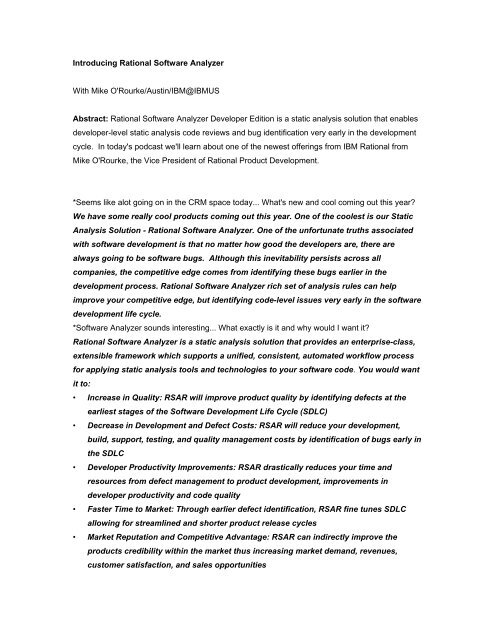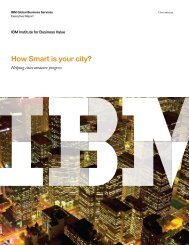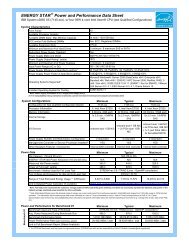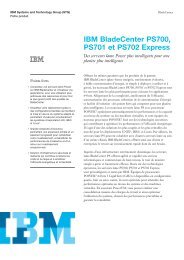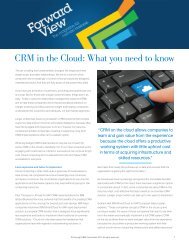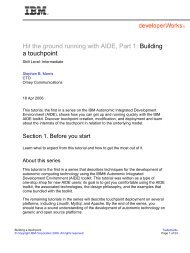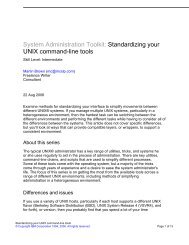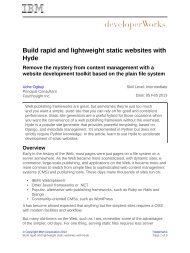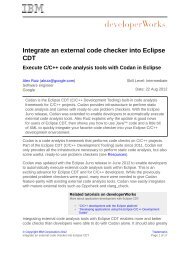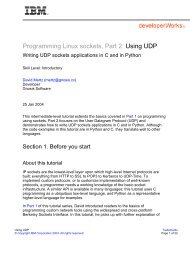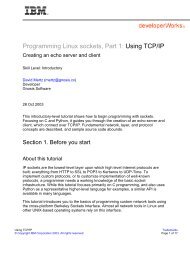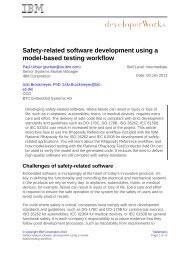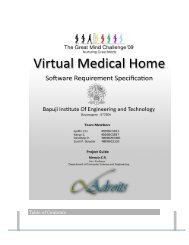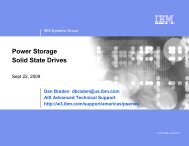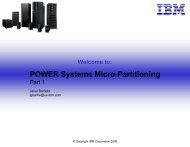Introducing Rational Software Analyzer
Introducing Rational Software Analyzer
Introducing Rational Software Analyzer
You also want an ePaper? Increase the reach of your titles
YUMPU automatically turns print PDFs into web optimized ePapers that Google loves.
<strong>Introducing</strong> <strong>Rational</strong> <strong>Software</strong> <strong>Analyzer</strong><br />
With Mike O'Rourke/Austin/IBM@IBMUS<br />
Abstract: <strong>Rational</strong> <strong>Software</strong> <strong>Analyzer</strong> Developer Edition is a static analysis solution that enables<br />
developer-level static analysis code reviews and bug identification very early in the development<br />
cycle. In today's podcast we'll learn about one of the newest offerings from IBM <strong>Rational</strong> from<br />
Mike O'Rourke, the Vice President of <strong>Rational</strong> Product Development.<br />
*Seems like alot going on in the CRM space today... What's new and cool coming out this year?<br />
We have some really cool products coming out this year. One of the coolest is our Static<br />
Analysis Solution - <strong>Rational</strong> <strong>Software</strong> <strong>Analyzer</strong>. One of the unfortunate truths associated<br />
with software development is that no matter how good the developers are, there are<br />
always going to be software bugs. Although this inevitability persists across all<br />
companies, the competitive edge comes from identifying these bugs earlier in the<br />
development process. <strong>Rational</strong> <strong>Software</strong> <strong>Analyzer</strong> rich set of analysis rules can help<br />
improve your competitive edge, but identifying code-level issues very early in the software<br />
development life cycle.<br />
*<strong>Software</strong> <strong>Analyzer</strong> sounds interesting... What exactly is it and why would I want it?<br />
<strong>Rational</strong> <strong>Software</strong> <strong>Analyzer</strong> is a static analysis solution that provides an enterprise-class,<br />
extensible framework which supports a unified, consistent, automated workflow process<br />
for applying static analysis tools and technologies to your software code. You would want<br />
it to:<br />
• Increase in Quality: RSAR will improve product quality by identifying defects at the<br />
earliest stages of the <strong>Software</strong> Development Life Cycle (SDLC)<br />
• Decrease in Development and Defect Costs: RSAR will reduce your development,<br />
build, support, testing, and quality management costs by identification of bugs early in<br />
the SDLC<br />
• Developer Productivity Improvements: RSAR drastically reduces your time and<br />
resources from defect management to product development, improvements in<br />
developer productivity and code quality<br />
• Faster Time to Market: Through earlier defect identification, RSAR fine tunes SDLC<br />
allowing for streamlined and shorter product release cycles<br />
• Market Reputation and Competitive Advantage: RSAR can indirectly improve the<br />
products credibility within the market thus increasing market demand, revenues,<br />
customer satisfaction, and sales opportunities
*So who exactly are the target customers for <strong>Software</strong> <strong>Analyzer</strong>?<br />
Any organization that develops software applications in-house: Our Developer Edition is<br />
targeted specifically for developers as an end user, and for Development Managers to<br />
enforce IT Governance and Compliance and code quality issues. Our Enterprise edition is<br />
targeted at those stake holders responsible for compliance, governance, collaboration;<br />
Build, Development, QA and Test Managers and Directors; VPs; CxOs, and Architects.<br />
*Sounds like something that makes sense for our Quality Management sales plays so why is it in<br />
CRM?<br />
We are finding that this solution can fit anywhere in the <strong>Rational</strong>. However, our strongest<br />
demand falls into automating and governing code quality earlier in the <strong>Software</strong><br />
Development Life cycle. Tying it to the build and having it part of the automated build<br />
process is the key to enforcing this within the overall SDLC.<br />
*What exactly is the relationship between <strong>Software</strong> <strong>Analyzer</strong> and Build Forge?<br />
As stated in the last question, tying this to the overall build process and automating the<br />
code analysis function has been a request from many Build Forge customers. Today,<br />
RSAR Enterprise will be shipping with a Build Forge Adapter to allow for automation of<br />
code scanning capabilities within the overall build process. Build Managers today have no<br />
insight into the quality for the code, and with Build Forge having the ability to kick off an<br />
automated code scan prior to the build and the centralized reporting capabilities providing<br />
analysis data on the code, allows them to better manage their builds.<br />
*I get it now, but isn't there still play with our new Watchfire acquisition?<br />
Yes there is. Much like AppScan can be used in QA organizations to find security bugs<br />
along side of functional and performance bugs, AppScan Developer Ed can be employed<br />
by developers alongside RSAR to identify security issues at the development stage just as<br />
RSAR is used to identify code quality issues.<br />
*Didn't some of this use to be in RSA? Is this not still a function of RSA?<br />
Yes this originated in RSA as its static analysis function and RSA will continue to utilize<br />
the same subset of Java rules that exist today.<br />
*What are your language support plans?<br />
Today we focus mainly on Java Code review (550+ rules) including data and control flow,<br />
<strong>Software</strong> metrics (40+ rules) including McCabbe, Halstead, etc., Structural analysis (24<br />
rules) pattern and anti-pattern detection but we also have C/C++ focused on code review<br />
(150+ rules). We have plans on expanding our C/C++ rules and adding PHP, JavaScript,<br />
Cobol and Perl.<br />
*This is a competitive space. How is this product better than Klocwork or some of the other static<br />
analysis tools out there?
The key is the extensible and open integration framework that offers a centralized point of<br />
collaboration that will integrate with other analysis solutions for single session scanning<br />
and to Build Forge to provide a fully automated, end-to-end solution. Now IT organizations<br />
can automate this process and also enforce Governance and Compliance as part of their<br />
overall SDLC process. The ability to provide centralized reporting will also provide insight<br />
to management on whether this process is being adhered to.<br />
*OK, but what if a customer already has a static analysis tool (such as Black Duck or Klocwork) in<br />
place? Can <strong>Software</strong> <strong>Analyzer</strong> integrate with it?<br />
Great question and the answer to that is yes! RSAR has an extensible pluggable<br />
framework - and the whole premise around having this framework is to eliminate any "rip<br />
and replace" aspect that most frameworks require. Having A unified framework allows<br />
developers to run multiple types of static analysis assessments within a single session<br />
providing for increased productivity and more concise analysis of the data.<br />
*Now I'm excited, when is this available and how is <strong>Software</strong> <strong>Analyzer</strong> packaged and licensed?<br />
The product will be announced 4/22/08 and will eGA 4/29/08. We have 2 editions, <strong>Rational</strong><br />
<strong>Software</strong> <strong>Analyzer</strong> Enterprise Edition and <strong>Rational</strong> <strong>Software</strong> <strong>Analyzer</strong> Developer Edition.<br />
The RSAREE is sold on a per server basis and the RSARDE is sold on a per authorized<br />
user basis.


